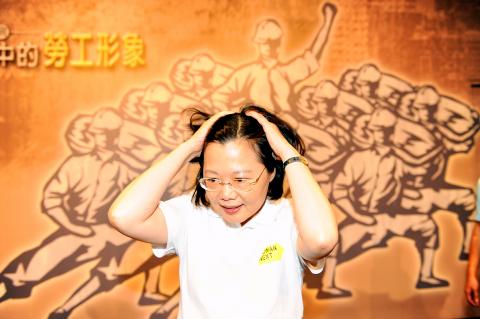The Democratic Progressive Party (DPP) yesterday said it hopes to turn the table in the January presidential and legislative elections by winning more votes from Aborigines, who have traditionally been strong supporters of the Chinese Nationalist Party (KMT).
In a joint meeting of its Aboriginal campaign headquarters, the DPP said it had for the first time established campaign offices in all of the nation’s 55 Aboriginal townships, proof of the party’s ambitious and aggressive strategy to win more Aboriginal votes on Jan 14.
While in past elections the party had essentially conceded the difficult Aboriginal districts, DPP Deputy Secretary-General Hung Yao-fu (洪耀福) said the current efforts “reaffirmed the DPP’s dedication and commitment to Aborigines.”

Photo: Chang Chung-i, Taipei Times
An analysis of previous elections show that the KMT has won the Aborigine vote by a ratio of seven to three over the DPP.
There are about 500,000 Aborigines in Taiwan, representing about 2 percent of the population.
With some opinion polls showing a neck-and-neck race between DPP Chairperson Tsai Ing-wen (蔡英文) and President Ma Ying-jeou (馬英九), Aboriginal votes could be a deciding factor.
If the DPP increased its vote share among Aborigines by 10 percent, it might very well win the presidential election, Hung said.
DPP Aboriginal representatives said they had noticed a shift in the political leanings within their tribes, former Taitung County commissioner Chen Chien-nian (陳建年) said.
“The tide is turning,” he said.
Chen, who left the KMT after more than 30 years to join the DPP, said the attitude of the DPP presidential ticket toward Aborigines was very different from that of Ma.
Tsai has pledged to offer an official apology to Aborigines if she is elected, Chen said, while DPP vice presidential candidate Su Jia-chyuan (蘇嘉全) spent a lot of effort vying for Aboriginal support when he ran in the Greater Taichung mayoral election last year.
Despite Su’s loss by a small margin, support for the DPP in Heping (和平), a mountainous area populated predominantly by Aborigines, went from 10 percent to 40 percent, Chen said.
In contrast to Tsai and Su, Ma has failed to deliver on his campaign pledges to Aborigines, including a NT$50 billion (US$1.65 billion) development budget for Aboriginal tribes, said Yohani Isqaqavut, chief coordinator of the newly opened Aboriginal campaign headquarters.
Ma’s comment about “treating Aborigines as human beings,” which has since made him notorious among Aborigines, reflected his lack of respect for the original inhabitants of the island, Yohani said.
The DPP’s efforts coupled with Ma’s failures, Yohani said, are why the party representatives are hoping to send to the legislature Tseng Chih-yung (曾智勇) and Antonio I.C. Hong (鴻義章), who will run in districts of highland and lowland tribes respectively.

The Ministry of Education (MOE) is to launch a new program to encourage international students to stay in Taiwan and explore job opportunities here after graduation, Deputy Minister of Education Yeh Ping-cheng (葉丙成) said on Friday. The government would provide full scholarships for international students to further their studies for two years in Taiwan, so those who want to pursue a master’s degree can consider applying for the program, he said. The fields included are science, technology, engineering, mathematics, semiconductors and finance, Yeh added. The program, called “Intense 2+2,” would also assist international students who completed the two years of further studies in

Former president Tsai Ing-wen (蔡英文) departed for Europe on Friday night, with planned stops in Lithuania and Denmark. Tsai arrived at Taiwan Taoyuan International Airport on Friday night, but did not speak to reporters before departing. Tsai wrote on social media later that the purpose of the trip was to reaffirm the commitment of Taiwanese to working with democratic allies to promote regional security and stability, upholding freedom and democracy, and defending their homeland. She also expressed hope that through joint efforts, Taiwan and Europe would continue to be partners building up economic resilience on the global stage. The former president was to first

Taiwan will now have four additional national holidays after the Legislative Yuan passed an amendment today, which also made Labor Day a national holiday for all sectors. The Chinese Nationalist Party (KMT) and Taiwan People’s Party (TPP) used their majority in the Legislative Yuan to pass the amendment to the Act on Implementing Memorial Days and State Holidays (紀念日及節日實施辦法), which the parties jointly proposed, in its third and final reading today. The legislature passed the bill to amend the act, which is currently enforced administratively, raising it to the legal level. The new legislation recognizes Confucius’ birthday on Sept. 28, the

MORE NEEDED: Recall drives against legislators in Miaoli’s two districts and Hsinchu’s second district were still a few thousand signatures short of the second-stage threshold Campaigners aiming to recall Chinese Nationalist Party (KMT) legislators yesterday said they expect success in 30 out of 35 districts where drives have passed the second-stage threshold, which would mark a record number of recall votes held at once. Hsinchu County recall campaigners yesterday announced that they reached the second-stage threshold in the recall effort against Legislator Lin Szu-ming (林思銘). A total of 26,414 signatures have been gathered over the past two months, surpassing the 10 percent threshold of 23,287 in Hsinchu County’s second electoral district, chief campaigner Hsieh Ting-ting (謝婷婷) said. “Our target is to gather an additional 1,500 signatures to reach